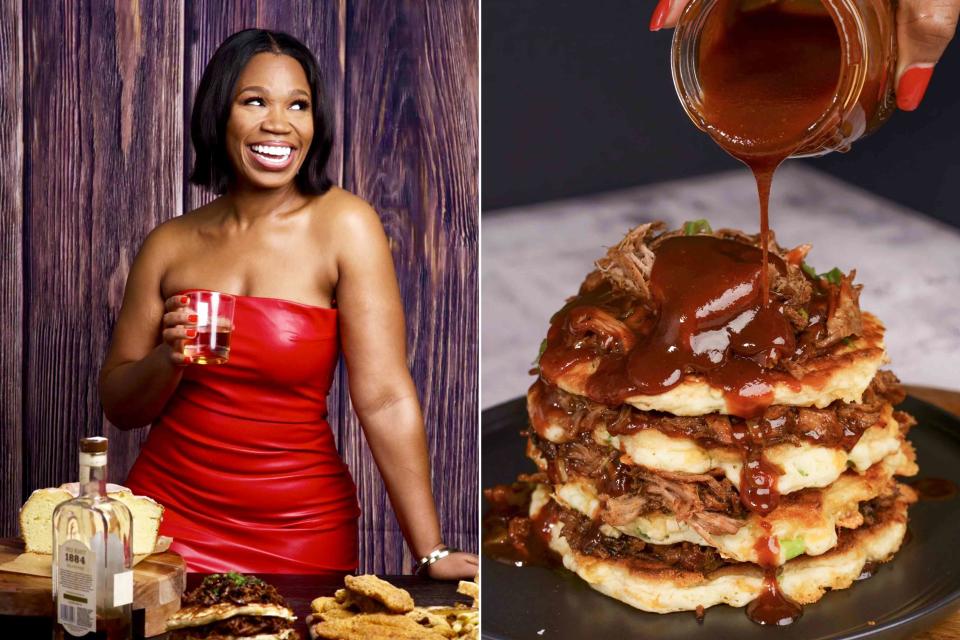Danni Rose’s Debut Cookbook Is a Celebration of Blackness, Juke Joints, and Southern Cooking
The television chef welcomes readers into her family’s juke joint with fried fish, banana pudding pancakes, and whiskey-spiked slushies.

John Hanney
“Imagine a little wooden house, where the smell of fried food and cigarette smoke fills the air and smacks you right in the face as soon as you step in,” Danni Rose writes in her new cookbook, Danni’s Juke Joint Comfort Food, about the juke joint that shaped her childhood. “The symphonious sounds of Bobby Womack, Battery Wright, or Johnnie Taylor fill the room. Assorted tables and chairs are scattered around the room and bar stools lined up along the bar. My father had a jukebox that sat to the left and a dance floor as shiny as a new penny to go with it.”
For Rose, the juke joint in this passage is home, a welcoming vibe and mentality for cooking, and a way of life with happy memories from her childhood. “My dad’s juke joint opened at 5 p.m. and was a candy store during the day,” she says. Rose lives in Los Angeles, a fitting place for a chef who judges on Food Network’s The Big Bake and hosts her own cooking series on YouTube. But in her heart, home is Birmingham, Alabama, where she grew up and where her late father ran a juke joint called Haywood’s Place. Her cookbook is a way for her to use the juke joint to share her style of Southern cooking and tell her story.
Juke joints, those informal restaurants and bars in Black communities, offer spaces where Black folks can get together and eat delicious plates of fried chicken, stewed cabbage, and macaroni and cheese as they listen to music and catch up with other members of the community. “I always compare it to a jumping Cheers-style bar,” Rose says, with the caveat that since juke joints are not necessarily listed on Google Maps, you have to know someone who has been who will share the address or let you go with them. “It’s one of those places where you have to know where it is in order to get in and when you walk in the door someone says ‘Hey, how you doin?’ welcoming you,” she explains.
While on the surface it may read like another example of an informal restaurant space where people can eat cheaply and quickly, the juke joint is really about celebrating Blackness, where people can dance, talk and eat late into the night. “The thing about people in the South is that it’s all about connection and community,” Rose says. The vibe is celebratory, the food is familiar, the music is fantastic and the drinks are strong, she adds, with a smile on her face. “That’s what juke joints offer.” And though Haywood’s Place doesn’t exist anymore, she says the feeling of community and responsibility for one another still permeates Southern culture.
For Rose, being the daughter of a juke joint owner also meant filling in when help was needed and getting to see firsthand how the space offered safety and fun for guests. Kids weren’t allowed in the juke joint because it was a space for adults, Rose says, but when the kitchen was short-handed, her father would make an exception for her. “I had to work in the restaurant and sometimes I had to fry the chicken,” she recalls. In her book, she shares some of her other favorite memories of Haywood’s Place, like when her sister and college friends snuck into the space to drink strawberry daiquiris, and watching her father throw men out for acting rowdy. “I grew up in a neighborhood that wasn’t the best, but we sure had the best times and it all started at Haywood’s Place,” she writes.
In her book, Rose walks the home cook through the key tenets of juke joint cooking as she shares recipes inspired by those memories. First, have a good time. And when it comes to the flavor, there should be lots of it. She writes that you have to make sure everything is ‘sopped up,’ meaning it has a mix of flavors instead of being one-note. She stacks banana pudding pancakes with butter syrup, and makes pulled pork pancakes as a savory alternative to fried chicken and waffles (which Rose calls “an up North thing”), balancing savory and tangy notes with the tender pulled pork and a smoky barbecue sauce.
Rose uses the book to meld the flavors of her childhood with what she enjoys eating now, pulling from time-honored traditions and the cooking lessons she picked up from her mother, aunts, and community members. Take her fried fish sandwich recipe, which was inspired by her family and “the fried fish man on the corner in Birmingham” who would set up a deep-frying station and sell crunchy fried catfish on sliced white bread. The dish sounds deceptively simple but requires that the cook get each part right. “It’s so underrated,” Rose says. “The fish has to be pillowy soft and the crust has to be crunchy, with the flour and cornmeal in perfect balance.”
Hitting the right note is what the juke joint environment is all about, Rose notes, adding, “I want people to feel a connection and learn how we truly are within our communities.” She thinks of her book as her own juke joint, complete with food, drinks and stories to share. “Call it ‘Danni’s Place.’ I really want people to get back in the kitchen and feel like I’m there with them and I want readers to be left with the spirit of joy. Food is supposed to leave you with that feeling.”
For more Food & Wine news, make sure to sign up for our newsletter!
Read the original article on Food & Wine.


